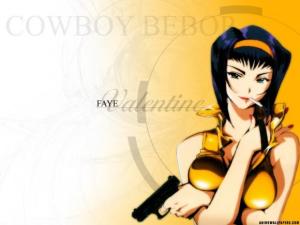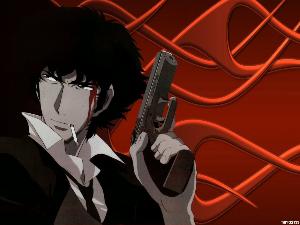First of all, I’m a reader who loves an anti-hero and an anti-heroine. The anti is one of my favourite protags.
The reason why I enjoy them so much is because the moral struggle and ambiguity makes for a dark and complex character. I guess it’s pretty obvious that the interesting and well developed character is right at the top of my reader’s checklist.
Another item high up on the list are themes/characters/etc that challenge me, that make me think. The anti-hero/ine definitely does this because they always make me wonder what I would do in similar circumstances. An interesting question, yes.
Anyway, what got me mulling on this topic was a post Kristie J wrote about Linda Howard’s Death Angel (which I loved – thought it was one of her best books in a long while) and one where Carolyn Jean questioned whether the morality bar was set higher for fictional and real heroines.
I was fascinated by the discussion and it made me come up with a few questions of my own…
Why is it some readers are more accepting of an anti-hero than they are of an anti-heroine in books?
Does it all boil down to gender, which anti has what parts?
In other words, are some female readers unable to relate to an anti-heroine character because they can’t imagine themselves in the same position? Maybe it hits too close to home?
Or are female readers just more convinced that a male character is capable of such questionable ethics?
What do you think?




I’ll be Hastings to your Inspector Poirot.I think part of it is societal roles. Girls are supposed to be nice and kind and soft, bad boys are hot. Stupid and unfair but pretty common. I think anti-heroes are more interesting because you’re never quite sure what their motivation is, they keep you off kilter. Sometimes traditional heroes seem a bit “too good”. Most of us are less than perfect and pure and find those who are to be a bit suspicious. More so for men than women. I’m not particularly drawn to those characters but I don’t mind them. I admire anti-heroines because I tend to fall into that traditional female role and sometimes I like to think I could just kick ass and take what I want. So a bit of fantasy happening there. Obviously I’m not admiring psychopaths who don’t care about anyone, but somewhere in the middle. I’m thinking La Femme Nikita, (in French – not the horrid American remake).
Cool, but I gotta warn you my Belgium accent sucks. LOL.I think you’re right, and I think it’s particularly the case when it comes to issues like sexuality and agression in female roles/characters. CJ and other commentators pointed out how readers seem to be more accepting about ‘morality’ when it comes to non-traditional heroines in spec fiction. But when it comes to contemporary fiction… it seems like it’s another matter altogether.The female protag in Death Angel is a perfect example where many readers castigated the author and the book because she was a mistress to a baddie. Apparently she was a whore because she did what she had to do to survive. Go figure.
Hi there KrisWhilst HP is really cool, I much prefer Miss M, she is an artist at recognising the faults in us all!But I digress… back to Death Angel.Is it possible that the female reader is more critical of the female anti-heroine? Can it be that because we can more easily read the female character we are far less tolerant of whatever is lacking? Whereas in an anti-hero the female reader is more willing to say/think, “how like a man to…” Anyway, as I stated on Kristie J’s blog, I really enjoyed the character – and read with a good deal of interest her growth within the novel. Linda Howard rocks!
I love both anti-heroes and anti-heroines. Partly because they can get away with living a life that you can only fantasise about. Plus, they usually have well-hidden hearts of gold anyway.
Just to be pedantic, whether I like or dislike an anti-heroine dpends on how ‘anti’ they really are. I like the aggressive, flawed heroines found in UF. However, I have very occassionally read some books where the heroine has tipped the balance from ‘plucky, yet assertive’ to ‘complete bitch, should be the villain’. It’s like they move a step on from being an anti-heroine and lose any sympathy from me.I suppose it’s the same as a hero moving on from alpha to arsehole. By the end of the book, the anti-hero/heroine should have gain a measure of our respect; we should empathise to some extent with their situation or feelings; we should be happy that they have defeated the bad guys instead of wishing the bad guys had defeated them.The other point is that an anti-hero/heroine must be redeemable. It doesn’t matter how badly they have behaved during the book as long as by the end they have atoned in some way for that bad behaviour.
Very true re: Miss Marple, Mumma. She is a Goddess at assessing the character of people.I do think you’re right that some female readers are more critical of the anti-heroine because of the way they ‘read’/ relate/ whatever to a female character. Whether we like it or not, admit it or not, all of us read subjectively and it struck me about this particular discussion more so than others that gender definitely comes into play too.Twas a good book. 🙂
Me too, Sean, me too. Although sometimes their hearts of gold are VERY well-hidden, ringed with barbed wire fences and rigged with explosives.
Great points, Jen. Because I want to pick your brain more: do you think it really boils down more to whether the reader can empathise with and believe the anti-hero/ine is redeemable rather than what readers want/ relate/ expect in a female (or male) character?
The trouble is that reader expectations are so subjective. With an anti-hero/heroine I expect not to like them at first, so if they don’t ‘fit’ my expected roles for them, then that’s OK, as long as there’s consistancy. You can’t have a tough UF heoine who dissolves into tears all the time or a man who has difficulty in expressing emotion who suddenly becomes all open and eloquent after meeting the heroine. It just doesn’t work.I do expect character development, so the hero who clams up at the beginning may be starting to open up a bit by the end. The heroine can show a softer side by possibly crying, but only after the powers of evil have been defeated and she can relax and allow the emotion to overwhelm her.What really annoys me is when readers expect a kind of double standard when it comes to the heroine’s sexual behaviour. She can be as agressive as she likes outside the bedroom, but once in bed with the hero she must be the dominated, submissive one. The same goes for sexual experience – the hero can be as promiscuous as he wants but not the heroine. Let’s face it feminism and equal opportunities is still a dirty word in some places and that reflects on reader reactions to female characters who don’t fit into the accepted modes of behaviour.
I think you hit the nail on the head with regard to reader expectations, Jen. I think that regardless of whether a hero/ine is anti or not some readers expect to find the main protags likeable (in some way, shape or form) either from the outset or early on in the book.Sexual behaviour seems to be a deal breaker for many when it comes to female protags and your right about certain characteristics being more acceptable than others. I don’t recall ever hearing of a book totally dismmised out of hand by readers because of the promiscuity of the male character. In romance, it seems like it’s generally accepted that a certain amout of sleeping around will occur before the guy enters into/commits to the relationship. For the girl however it’s a different kettle of fish.